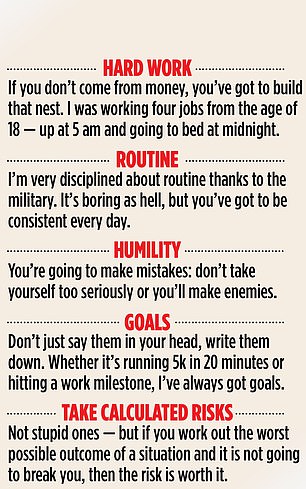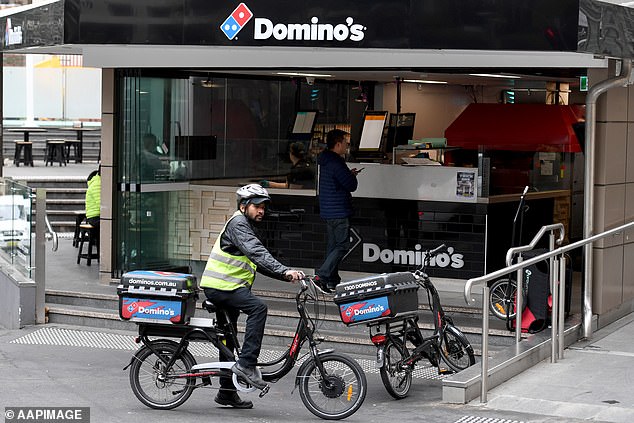How I made my money at Domino’s: from the Outback to running a £1.3 billion business
As England’s footballers strive to reach the knockout stages of the European Championship, thousands of Domino’s Pizza employees face a test of their own.
Britain’s largest pizza chain sells as many as 31 pizzas per second during a match in England and wants to maintain the average delivery time of 24 minutes.
The chap stretching out dough behind the counter at the Golders Green branch in north London looks in good shape for the challenge.
Workaholic: Domino CEO Andrew Rennie on his undercover mission as a chef in one of his stores
With gray hair and the freckled skin of a sportsman, he is slightly older than the average chef in the chain. But Andrew Rennie, dressed from head to toe in a Domino’s chef outfit and Nike sneakers, certainly looks the part.
He happily takes an order from a builder who walked in off the street. No one would suspect that this is his first time in this branch of Domino’s – or even that he is the boss of the £1.3 billion company, which has more than 1,300 outlets in Britain and Ireland.
“Football and pizza just go so well together,” grins the modest CEO.
He isn’t wearing his usual expensive watch, but says he does wear his pizza-making uniform most days.
He doesn’t have a car but loves his Kawasaki motorbike, although he won’t attempt deliveries on it.
He says, “This is our busiest time of year and we have to get it right.”

Andrew Rennie’s five tips for the top
Domino’s held on to its marketing budget early this year so it could make a big splash this summer. The company is also relaunching its ‘ultimate spicy sausage’ pizza, which was extremely popular during the last World Cup.
Investors hope this tournament will help Domino’s shares bounce back. At £3.19 they are a long way from their 2021 peak of £4.59.
With Rennie, who took over as FTSE 250-listed Domino’s UK & Ireland boss in August, the company has an experienced pair of hands.
He spent more than two decades aggressively growing this pizza empire globally, including leading the European business from 2014 to 2020.
Now the 56-year-old is eager to get more Pepperoni Passions and Twisted Dough Balls into the bellies of the British.
The company accounts for more than three-quarters of branded pizza sales in Britain, he says, but adds: ‘We have more than 1,330 stores in Britain and Ireland, but I want there to be 2,000 by 2032.’
It’s a far cry from the only British branch in Luton in 1985, when the North American franchise first expanded abroad.
He is moving to smaller towns and villages now that the cities are saturated. But is there antipathy to the landing of a brash Domino in the shires?
‘If they don’t like us, they don’t show it very well – they buy a lot of pizza. Many of those villages have very few brands, so we have become a suitable place.”
He too grew up in part of Wagga Wagga in New South Wales, with a population of just 6,000.
Rennie joined the army at the age of 15. After a decade of toil, he decided to open a Domino’s – a fairly small pizza franchise in Australia at the time – in his small hometown.
‘Head office pointed out that the average store had about 50,000 residents, and mine had 10 percent of that, and was going out of business.
But I got it open and became obsessed with service. If a pizza was late, or if we made a mistake, I would go to people’s houses, offer them free pizza, free Coke, and beg them to come back. I knew the names and addresses of 350 customers by heart, and I would personally handle their pizza.”
Rennie frowns, apparently still upset, and recalls the address and concerns of Mr. Grey, who complained about a scant amount of jalapeno on his pizza thirty years ago.
To say this CEO is obsessed with customer service is an understatement.
‘I wouldn’t sleep if I lost a customer. I was so driven that from our small store, smaller than most home kitchens, we became the number one store in Australia.”
He then built a 30-strong Domino’s franchise over ten years before being approached to sell in exchange for a stake in Domino’s Australia. When it went public in Sydney and the company bought the Domino’s franchise for France, Belgium and the Netherlands, Rennie moved to Paris.
‘I was the only one who could count to ten in French, so I was sent to lead France in 2006;
In five years, the father of three tripled the size of the French company.

Shift: Domino’s is moving to smaller cities and towns, now the cities are saturated
After three years running Down Under Domino’s in Australia and New Zealand, Rennie returned to the continent to lead the European division, growing Domino’s in Germany to 1,200 locations. He retired four years ago – after earning enough to never work again – to live on his farm in Australia.
He was 52 and his ‘retirement’ was short-lived. There was never any free time, as Rennie set up 25 businesses during that time, including a cheesecake maker, a car wash, a whiskey distillery and a cattle ranch, but even that wasn’t enough.
When his ex-wife moved to London with their youngest son, he also moved to England.
He says, “Then Domino’s Pizza Group came knocking on my door and I couldn’t retire.”
Now Rennie is turning her razor-sharp focus on British and Irish growth. At the top of his list is Domino’s loyalty program: ‘We have 30 million active customers in our database, who purchase an average of 4.3 times a year. My wish is to get them to five.’
More ambitiously, he has drawn up a mysterious shopping list, hoping to catch a smaller competitor: ‘A brand with 50 or 80 points of sale, where all start-up mistakes have already been made.’
He’s looking for a brand that Brits will want to enjoy during the day, as 90 percent of Domino’s pizzas are spotted in the evening.
The CEO always thinks about the future. He talks about drones and driverless deliveries that will happen “in about five years,” and admits, “The rarest asset on Earth right now is people, people who deliver the products.
For the time being, we are focusing on electric bicycles: better for the environment, and much faster for our customers.’
There is a moment of silence when Rennie’s latest creation comes out of the oven. He put some chocolate chip cookies, butter and cinnamon into pizza dough to create a new dessert. I was skeptical, but tore it down and licked the box clean.
Will Domino’s deliver this to any party as an election boost?
“This company has been around for almost 40 years and has done well regardless of who is in charge,” the Australian replies. ‘I have witnessed elections in France, Australia, Germany. We simply say: vote for pizza.’
With that, Rennie takes me behind the counter to teach me the secrets behind the perfect Domino’s pizza. It’s harder than it seems. I am gently told that my effort would not pass the test – a dodgy crust.
As I leave, Rennie squeezes out another ball of dough.
Shrugging his shoulders, he says, ‘Unfortunately, I’m addicted to work. But I’m lucky that I can be here because I want to be.”
And with that, Rennie grabs another handful of pepperoni and continues with his pizza.
Some links in this article may be affiliate links. If you click on it, we may earn a small commission. That helps us fund This Is Money and keep it free to use. We do not write articles to promote products. We do not allow a commercial relationship to compromise our editorial independence.
